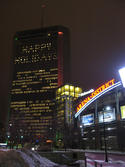We've decided to become a one car family. Denver has proven to be the ideal locale for this experiment, of sorts. The "Mile High City," and particularly our new neighborhood, provide a range of mobility options beyond the four-wheel variety for trekking from place to place.
The metropolitan area is naturally blessed with a mobility-favorable landscape. It is approximately 10 miles by 10 miles. More importantly, our neighborhood possesses what I affectionately refer to as “accessible proximity” to local amenities such as grocery stores, coffee houses, parks, and specialty shopping centers. The immediate area is not only safe, it's engaging in its physical and social makeup, with stately homes and troves of dog-walkers along suburban style streets. read more »




















